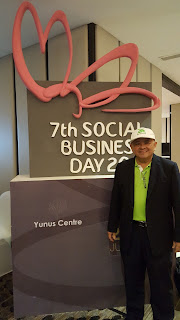IT has been more than a year since Ipoh was declared a Social Business City by Perak Mentri Besar Datuk Seri Dr Zambry Abd Kadir during the Pangkor International Development Dialogue in September last year.
Since then, the Ipoh City Council had been busy meeting and having town hall sessions with various organisations and individuals to plan and create the ideal Social Business City where people can solve various local and social issues.
Ipoh Datuk Bandar Datuk Zamri Man said the city council wanted everything to be in place before they went full steam ahead.
“The implementation of the Social Business City is still at its early stage.
“We are still having a series of town hall meetings and public engagements so they can have a better understanding of the concept,” he said.
“We are also planning to have collaborations with our twin sister city Fukuoka, to learn more from them on the implementation of the concept,” he added.
He said the city council was also discussing with Malaysian Global Innovation and Creativity Centre (MaGIC) to help set up a Social Business Hub to attract more social entrepreneurs with calibre.
“The Social Business Hub is among our plan to allow start-up businesses to thrive.
“When in operation, it will become the centre to develop new and interested entrepreneurs,” he said.
Once implemented, Ipoh will be the first Social Business City in South-East Asia and the second in Asia, after Fukuoka and the fifth in the world.
The other Social Business Cities include Wiesbarden in Germany, Pistoia in Italy and Barcelona, Spain.
A social business is aimed at overcoming an issue for the benefit of needy and unfortunate persons and does not prioritise on generating profit.
It is an alternative to social welfare aid system for continuous and sustainable financial source.
Revenue from its investment capital will be reinvested for the purpose of achieving sustainable social impact.
Zamri said it was the state’s vision to have Ipoh emulate the existing Social Business Cities that had successfully resolved its social and environmental issues.
“In Ipoh, we hope to implement a social business model to address issues pertaining to poverty, drugs and safety.
“We also want to open up opportunities for youth to develop their potentials, talents and ensure equity development,” he said.
Zamri said the city council’s role was to encourage the development of social businesses through cooperation with the non-governmental organisations, dedicated folk, state government and private agencies to resolve certain issues.
“We will increase our efforts to promote this business concept to more entrepreneurs.
“We have identified several of these entrepreneurs that we can work together with to hold activities,” he said.
“Some of them are working closely with us during the monthly Car-Free Day programme,” he added.
Zamri said long before Dr Zambry made the announcement, there had been many social businesses operating in the city.
Among these, he said, were Daybreak, Ray of Hope, Salvation Army, Anning and several others.
Another example, Zamri said, was Koperasi Alam Hijau Perak Bhd (Kohijau), which was set up to tackle the issue of solid waste management.
“They have introduced a merit system whereby participants would be rewarded by sending in their recyclable waste to special bins to be recycled.
“Another example is MBike, which prepares environmental-friendly electric trishaw services for tourists in the city,” he said, adding that MBike has about 30 trishaws and several bicycles to be rented out.
“It has received positive response from tourists visiting heritage sites in the city,” he added.
He said MBike was also planning to provide the bicycle-sharing service, known as Cycledios to several other towns in the state, pending approval from the respective local governments.
Zamri said he believed that social businesses would be the model for the future.
“Not only that it will be a main contributor to the country’s economy, it will also help resolve a lot of issues that cannot be handled by the Government alone without the involvement of other parties.
“Given ample training and support from the Government, social business will have a big positive impact on the state and country,” he said.
https://www.thestar.com.my/metro/metro-news/2017/11/20/building-bighearted-businesses-ipoh-also-wants-to-set-up-hub-to-develop-social-entrepreneurs/


















